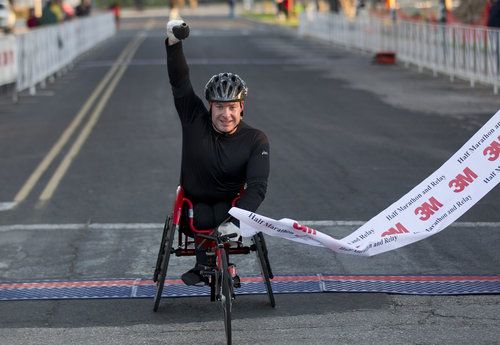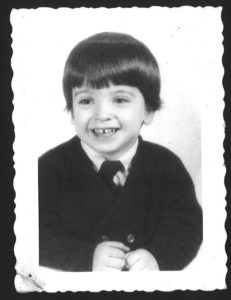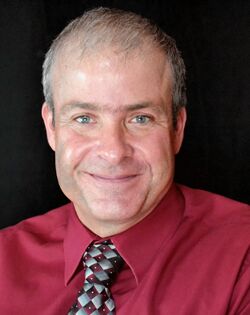 Matt Davis is the Director of the Student Accessibility Resource Center at Western Kentucky University that once was called Student Disability Services. The mission of this center is to provide accommodations for students with a wide range of disabilities, including extending time for tests, helping students with their housing accommodations, working with online students and/or providing a sign language interpreter if the student is deaf.
Matt Davis is the Director of the Student Accessibility Resource Center at Western Kentucky University that once was called Student Disability Services. The mission of this center is to provide accommodations for students with a wide range of disabilities, including extending time for tests, helping students with their housing accommodations, working with online students and/or providing a sign language interpreter if the student is deaf.
“We just provide extra support for students with disabilities to help them get to graduation,” Matt Davis says. Matt’s motto for life is, “Where there’s a wheel, there’s a way.”
Matt Davis was born with Spina Bifida and says, “I always tell my students that I never realized I had a disability until someone pointed it out.” Matt had to adapt to his surroundings because there was no Americans with Disabilities Act {ADA] when he was growing up. To go to elementary school, Matt’s dad, Bill Davis, had to help build a ramp in order for Matt to get in the school and go to class. Elementary school was somewhat difficult for Matt because he was in and out of the hospital often with various medical setbacks.
“But I was just like any other kid, except I had medical challenges. I rolled around on a skate board until one day my dad made some stirrups for a two wheel bicycle that I learned to ride. Although I’d shoot basketball with kids in the neighborhood, I didn’t really get into organized sports until my late 20s.”
Matt played basketball, tennis and sled hockey. However, when he discovered wheelchair racing, his life changed dramatically for the better!
Matt Davis: Becoming an Athlete with Spina Bifida
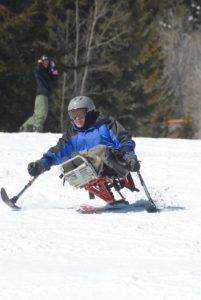 At 27, Matt was attending Western Kentucky University, majoring in social work, and he found a mentor that would impact his life in a number of ways. Her name was Huda Melky, she had known his mother, and she worked in the Disability Services Department. She was also the Affirmative Action Director for the school and an avid runner. Matt describes her as “a short, firecracker type woman from Syria who was passionate about the exercise benefits of running.”
At 27, Matt was attending Western Kentucky University, majoring in social work, and he found a mentor that would impact his life in a number of ways. Her name was Huda Melky, she had known his mother, and she worked in the Disability Services Department. She was also the Affirmative Action Director for the school and an avid runner. Matt describes her as “a short, firecracker type woman from Syria who was passionate about the exercise benefits of running.”
One day in her office, I saw the Paralympic Games on television, and I announced that I’d like to get into wheelchair racing. Melky who believed in getting things done in a hurry, told me, ‘We’re getting you a racing wheelchair.’
The Mayor’s Commission on Employment and Disability Issues in Bowling Green, Kentucky, and Melky collaborated to help Matt raise the money to purchase his first racing wheelchair.
“I met another lady on campus, Libby Graney, a triathlon athlete, who helped me get in shape for wheelchair racing, even before I got my wheelchair,” Matt explains. “She worked in the Wellness Center. Although not a person with a disability, she modified exercises and a training regimen for me to help me prepare for my first wheelchair race.”
“I started getting in shape and was fortunate I was at a college campus with access to a pool and a weight room to build my body up to become a wheelchair racer. I was adopted by the running community people at the college who were runners.”
“I’m not sure if they adopted me, or if I just aggravated them to the point that they helped me.”
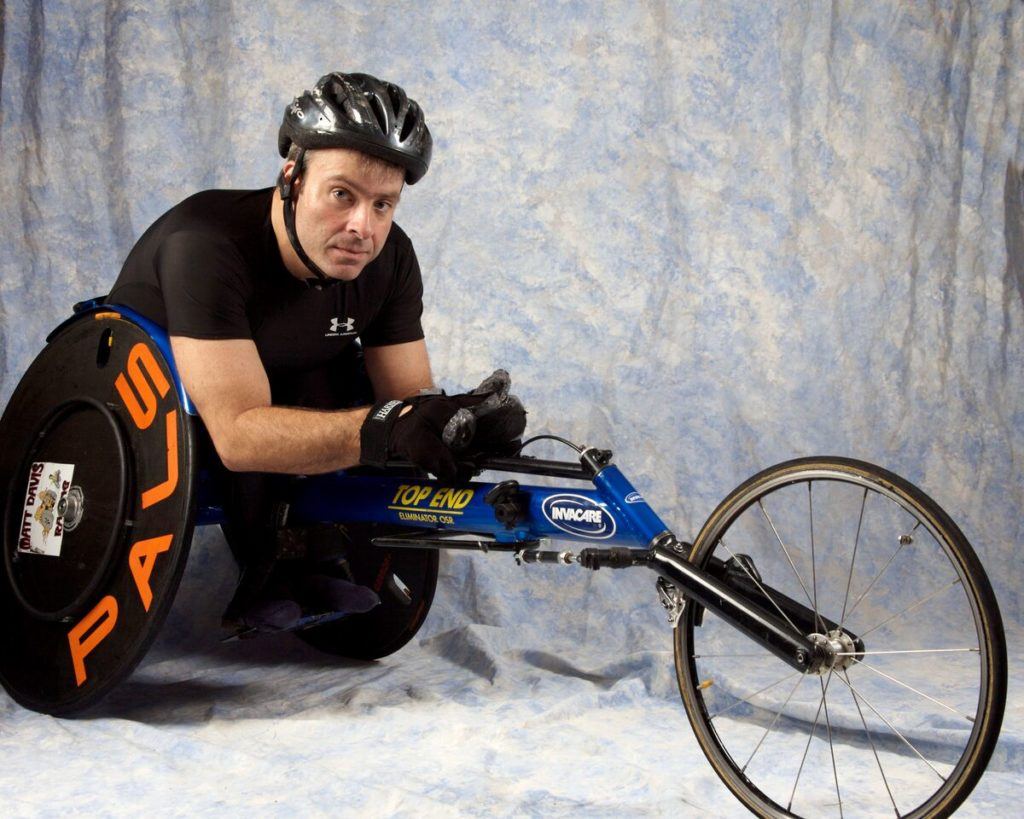
Matt found that wheelchair racing fed his need to be active and also introduced him to a close-knit community of like-minded people.
Bowling Green also held a race called the Medical Center 10K in the fall. Matt’s friends in the running community decided he needed to participate in this race first. It would be a great opportunity to showcase Matt and what he could do in his racing wheelchair.
The only problem was that Matt would only have 4 weeks to train. Matt felt the pressure of getting in shape to race the 6.2 miles of the 10K. This was not an easy feat to adapt to a new chair and train for his first race in such a short time.
Matt admits in the middle of his first race, he wondered, “What have I gotten myself into?” But, once he finished, Matt was hooked and couldn’t wait to sign up for the next race.
He enjoyed the freedom of wheelchair racing because it allowed him to practice and prepare for a race independently. The wheelchair team sports that Matt had participated in were all in Nashville, Tennessee, about an hour’s drive for him. But to participate in wheelchair racing, he didn’t have to wait for team members to show up or have to have a specific time to practice like he did with the team sports.
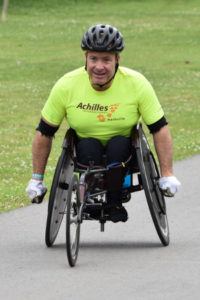 I liked wheelchair racing, since I always tried to be active, and I found I made a lot of friends dealing with the same challenges I was.
I liked wheelchair racing, since I always tried to be active, and I found I made a lot of friends dealing with the same challenges I was.
The next race that Matt participated in was a 5K held in Nashville – the Race for the Cure. But something happened that made Matt question if he would continue. “I was going around a turn and my wheelchair came up off the ground and ran on two wheels,” Matt remembers. “I thought I was going to flip over and crash. When the wheelchair got back on the ground, I said to myself, ‘I’m never going to do that again.’
“But what I came to learn about wheelchair racing was there was something new to learn in every race.”
“I also realized the running community was a subculture of its own. I met so many nice people who had the same passion I did. They were and are all health-minded people. Most of the races I attend now, I know many of the competitors, and they know me.
“In some of the races, we get to hang out with some of the Elite competitors – runners who are considered icons of the sport. Another thing I’ve noticed about the runners I’ve met and gotten to know is that they all seem to want to be as healthy as possible.”

The Oita International Wheelchair Marathon in Japan is the largest in the world
The biggest wheelchair race in the world is held at Oita, Japan, and Matt has competed in it 16 times, attending every year since 2001, except one. Because it’s the largest competition for wheelchair athletes in the world, many of the very best are at this event. Learn more about the event here.
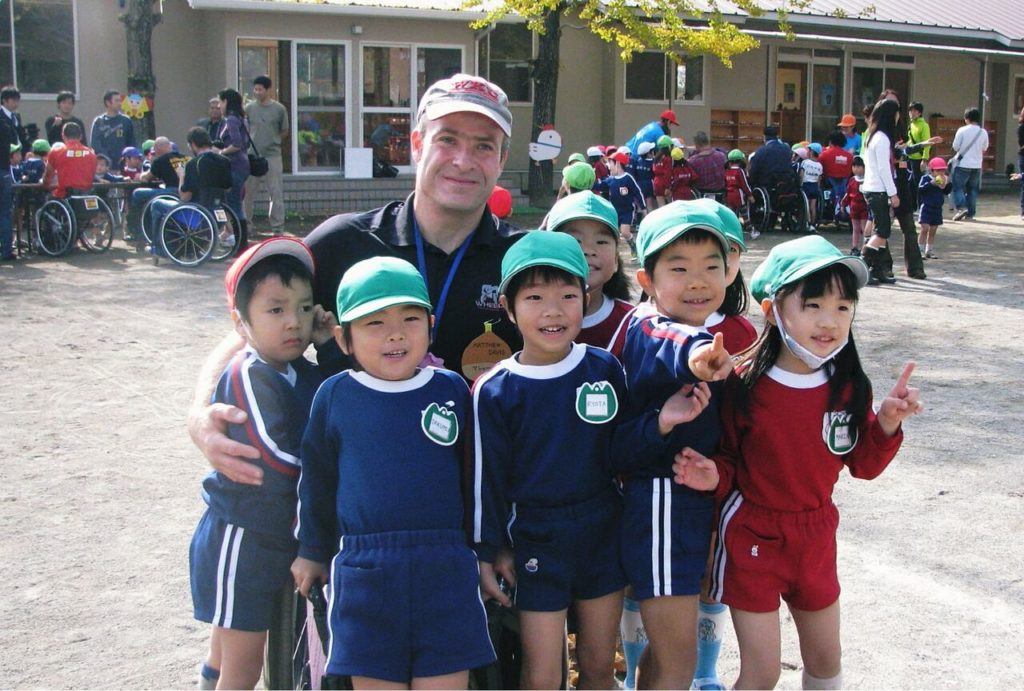 Matt described the experience of attending this FAMOUs race, saying, “if you are a wheelchair racer in Oita, Japan, you are treated like a rock star.”
Matt described the experience of attending this FAMOUs race, saying, “if you are a wheelchair racer in Oita, Japan, you are treated like a rock star.”
Matt also has raced seven times in one of the most prestigious marathons in the U.S. – the Boston Marathon. Some of the races are broken up by divisions, and one of the divisions is the Master’s Division where Davis does well. A Pro Division is made up of wheelchair racers who make a living racing wheelchairs – who Matt expressed major respect and admiration for.
In a single year, Matt will compete in about 15 different races. In November, 2016, he celebrated his 50th birthday. And to the contrary of popular belief, Matt has discovered that age hasn’t been a limiting factor in being a wheelchair racer.
Matt Davis finds his calling after returning to college
 Matt’s father, Bill, retired from the University of Western Kentucky as a professor and Head of the Economics Department. As Matt Davis puts it, “I grew up here. I made an attempt at college after high school, and I didn’t do well. I dropped out of school and took a bunch of part-time jobs.”
Matt’s father, Bill, retired from the University of Western Kentucky as a professor and Head of the Economics Department. As Matt Davis puts it, “I grew up here. I made an attempt at college after high school, and I didn’t do well. I dropped out of school and took a bunch of part-time jobs.”
The real motivation for Matt’s decision to return to college was because of a woman he was dating at the time. “I told this lady I was in college, even though I wasn’t,” Matt mentions. Matt decided to enroll in college to justify the lie. “I returned to the University of Western Kentucky when 27 as a non-traditional student, after I decided to grow up.”
Matt knew at an early age he wanted to help other people, but he didn’t think he could make a living helping other people. After considering several other majors, he took an entry level social work class and quickly realized that he had found his chosen profession. “One of the courses that I teach now at the University of Western Kentucky is that same entry level social work class.”
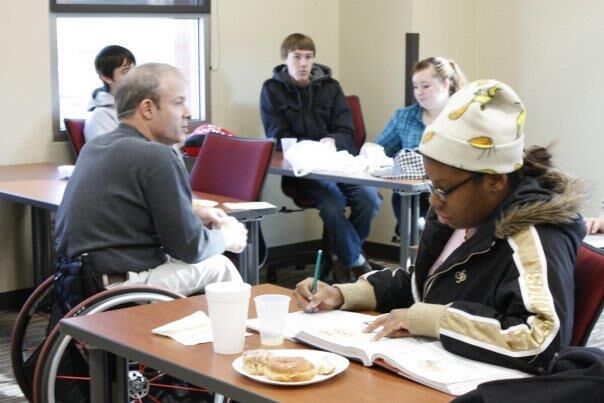
Matt Davis teaches courses at Western Kentucky University, his alma mater.
Matt found his life’s work and continued his education, receiving a master’s degree in social work. He was working in Tennessee as a mental health case manager when, on a day off, he ran into his mentor, Huda Melky, at a race.
She told him that they had an opening on campus for a Coordinator for Disability Services and encouraged him to apply. Matt applied for the job because he wanted to move back to his hometown and was offered the position, where he’s happily worked for many years.
I’m old and set in my ways. But seriously, I love to teach and love the energy of a college campus. Since I was a student here for about 20 years, I thought I’d just stay here.
Matt combines his passions to create new programs for student athletes
To bring his two worlds together of academia and athletics, Matt is in the process of creating two new programs of study for the university.
“I’m creating a Study Abroad Course and a Study Away Course. I want to take a group of students to one of the big wheelchair races in this country and then to Japan for a Study Abroad Course where they can learn the difference between adaptive sports and wheelchair racing. Although wheelchair racing is a part of adaptive sports, there’s a big difference in highly competitive wheelchair racing and adaptive sports.”
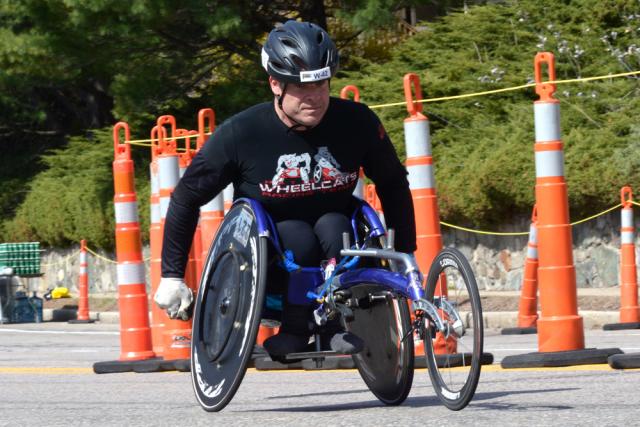
“The people who participate in highly competitive wheelchair racing are athletes who are serious about their conditioning and participating in a higher level of competition. There are opportunities for people to make a living as a top level wheelchair racer as they have sponsors and compete all over the world every year. When wheelchair racing, as we come to a big downhill section of the race course, we may be rolling our wheelchairs at 45 miles per hour without a roll bar.”
Matt hopes next year to take a group of students to a race he does in Georgia, the Peachtree Road Race, and to the Cedartown 5K the week before. The program will be offered to the general student population at the University of Western Kentucky, and the students will get college credit for both. The students will learn how to organize these types of events and have opportunities to interview the athletes, because every athlete has a different story to tell.
“The students who take these courses will learn more about people with disabilities and adaptive sports than any other students on campus will. We hope to have the Study Away program in the summer of 2018, and the Study Aboard program the following year.”
 Matt Davis learned about Cure Medical catheters at the Spina Bifida World Congress. He’s proven that he’s a think-and plan-outside -the-box kind of guy, with the ability and the desire to create new learning situations that never may have been possible previously.
Matt Davis learned about Cure Medical catheters at the Spina Bifida World Congress. He’s proven that he’s a think-and plan-outside -the-box kind of guy, with the ability and the desire to create new learning situations that never may have been possible previously.
Meet more friends who use Cure Catheters here.
Enjoy Our Free Resources & Articles
 CURE NATION is designed with you in mind, to offer assistance and education when you need it through a personal support program.
CURE NATION is designed with you in mind, to offer assistance and education when you need it through a personal support program.
All of the information you find below and on our related social media pages is meant to guide you to places, topics and, resources that enhance your life, while also connecting you with a growing group of friends.
- Sign up for our free, CURE NATION e-newsletter to have our latest stories delivered directly to you, once a month.
- Get our FREE LIFESTYLE + TRAVEL BOOKS here.
- Have an idea you’d like to share? Let us know.
- Be sure to take a minute to meet our Cure Advocates too.
You may also enjoy:

